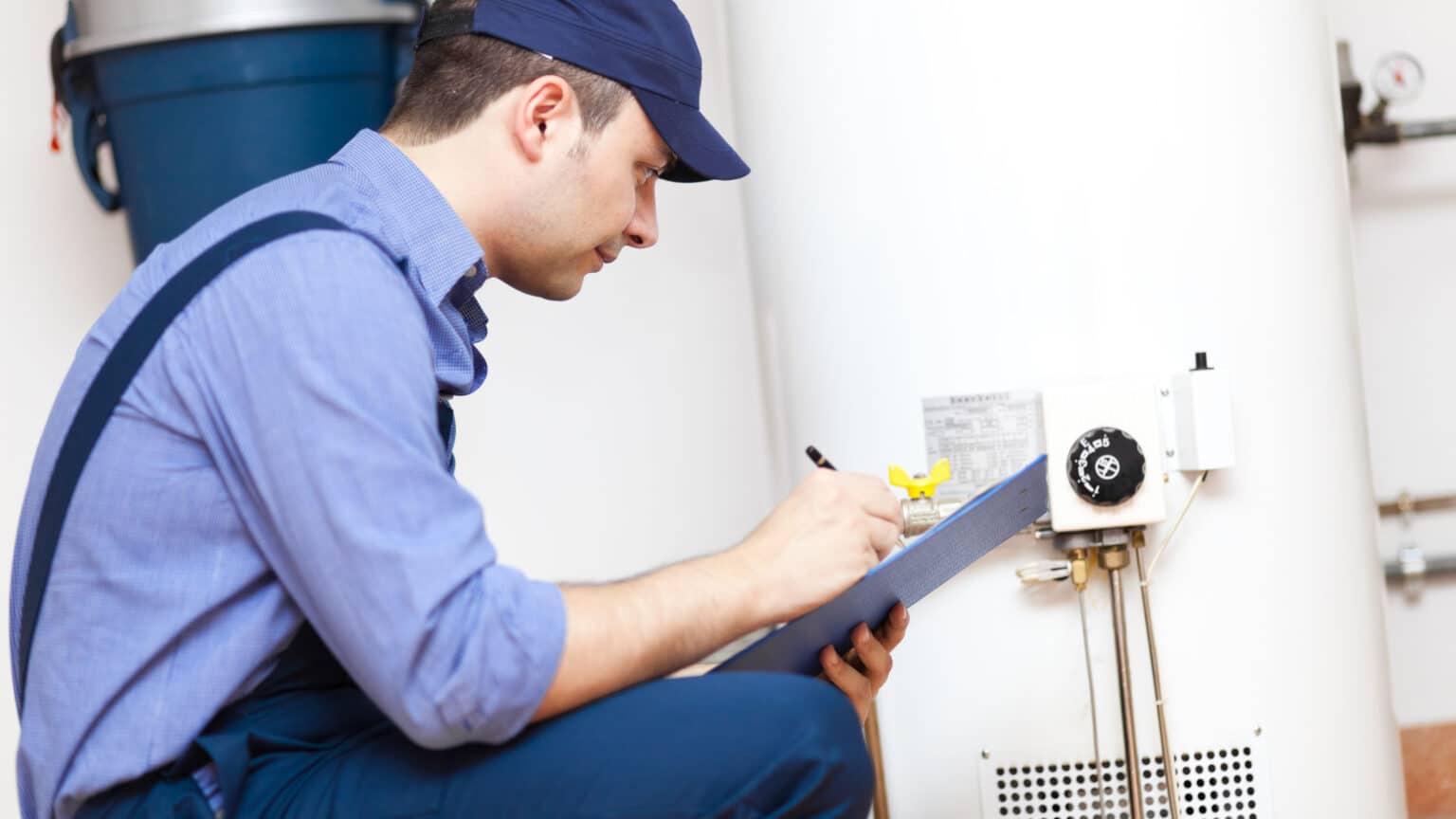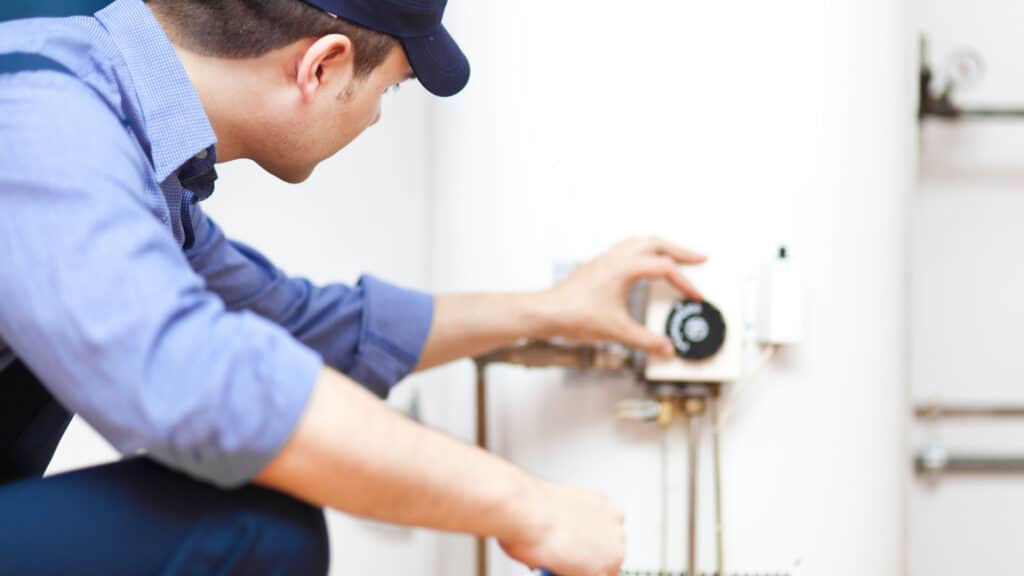Do you have a tankless water heater and wonder if it needs tankless water heater repair? You’re in the right place. Today, we’re answering the crucial question: does your tankless water heater need service, and what should you know about it?
Tankless water heaters offer great convenience. You never run out of hot water, can set your ideal temperature, and enjoy lower energy bills. However, like any appliance, they sometimes need repairs.
If your water heater isn’t working properly, it’s not doing its job. Spotting the signs early can save you from bigger issues down the line.
In today’s post, we’ll discuss the basics of tankless water heater maintenance, the benefits of regular upkeep, and when to call a professional. Stay tuned for tips on keeping your heater in top shape.
A Quick Review of Key Points
You may notice signs of wear and tear or malfunctioning components, indicating that your tankless water heater needs repair service. Additionally, you can call a qualified technician to diagnose the issue and provide timely and effective repairs.
Reasons Your Tankless Water Heater Needs Repair Service
Signs Your Tankless Water Heater May Need Repair
When it comes to repairing or replacing your tankless water heater, it’s best to weigh your options. There are several signs that might indicate your unit needs repair service.
Common Indicators of Heater Issues
If you hear strange noises coming from the unit, such as cracking or popping, then it might be time to have a qualified technician take a look at it. Additionally, if you notice a decrease in water pressure or the water temperature isn’t quite right, these are also signs of an issue with your tankless water heater.
DIY Fixes for Minor Heater Problems
On the other hand, not every issue requires professional repair services. Some minor repairs can easily be handled by a homeowner. For instance, if the filter on the unit is clogged with sediment, calcium, and/or lime buildup, you can easily take care of this yourself using basic cleaning tools.
How to Make an Informed Decision
No matter what your issue is, it’s important to weigh both sides of the situation in order to determine whether you should opt for repair services or some other solution. Being informed about factors like the age and performance of your system can help you make a more informed decision regarding how best to proceed.
Seeking Professional Assistance
The success or failure of any repairs will ultimately depend on an accurate diagnosis of the problem. If you think that something may be amiss with your tankless water heater but aren’t sure what it is, it may be beneficial to seek out professional assistance in order to identify and address the underlying issues. However, if you feel confident that you can handle the repairs yourself or have already identified what needs attention, then repair service may not be necessary.
Knowledge is Power When It Comes to Heater Repairs
It’s always best to arm yourself with knowledge in order to make an informed decision when faced with potential repairs for your tankless water heater.
Understanding Poor Efficiency and Low Water Flow
Now that we’ve addressed potential reasons for needing repair service let’s move on and explore what poor efficiency from low water flow could mean for your hot water supply.
Poor Efficiency from Low Water Flow
Poor efficiency due to low water flow can be a sign that your tankless water heater needs repair service. Low water flow can lead to inadequate, lukewarm water output, especially when multiple tasks like running the dishwasher and taking a shower are being done at the same time. If this is happening in your household, you should consider getting your tankless water heater checked out as soon as possible.
Those who debate this point may argue that many factors can contribute to low water flow, such as clogged pipes or a negative tilt in the piping system. While true, these possible factors will not necessarily fix the problem on their own, and a qualified technician should be able to fully diagnose any underlying issues leading to poor efficiency from low water flow. Moreover, it could be a sign of a malfunctioning heater that needs professional repair services to restore optimal performance.
It’s important to identify if poor efficiency due to low water flow is an issue for your tankless water heater so you can make an informed decision about whether or not you need repair services. If you do decide to seek out repair services, chances are you’ll be able to enjoy improved efficiency from optimum water flow soon after.
Now that we’ve discussed some of the signs that indicate your tankless water heater needs repair service due to poor efficiency from low water flow let’s turn our attention to another factor—unsafe temperatures from inconsistent heat output.
The Most Important Points to Remember
Low water flow can lead to inadequate, lukewarm water output from a tankless water heater and is one of the signs indicating that it needs to be repaired. Other possible causes, such as clogged pipes or a negative tilt in the piping system, should also be considered, but a qualified technician should still be called if these do not fix the problem. Professional repair services may be necessary to improve efficiency and restore optimal performance. Unsafe temperatures from inconsistent heat output are another factor to consider when deciding whether or not a tankless water heater needs repair service.
Unsafe Temperatures from Inconsistent Heat Output
When it comes to tankless water heaters, no one wants to deal with unsafe temperatures due to inconsistent heat output. After all, a sudden burst of cold water when you’re expecting hot could be an incredibly unpleasant experience. Unfortunately, if your heater isn’t providing enough heat or the flow rate is too low, you may find yourself in this situation.
There are several things that can cause inconsistent heat output. Clogged filters and worn-out components can block the flow of water, which in turn reduces the overall temperature. Accumulated sediment buildup in the pipes can also have a similar effect as well as reduce efficiency. Additionally, incorrect settings, along with having an undersized unit, can lead to inadequate performance and fluctuations in temperatures.
In order to diminish the chances of experiencing unsafe temperatures due to an uneven heated flow, it is important to take preventive measures such as regularly cleaning the filters, refraining from letting limescale deposits buildup inside the pipes, and occasionally checking for loose wires or worn out parts that can impede the output levels.
That said, it is possible for some issues to be out of our control, and if that’s the case, then seeking professional assistance might be a better option than trying to fix it on your own. However, before deciding that repair service is essential, it’s always advisable to first look for any signs of needed repair service—something we will cover more in-depth in the next section.
Checking for Signs of Needed Repair Service

The previous section discussed unsafe temperatures due to inconsistent heat output, which can be a sign of needed repair services. It’s important to check for other signs that may indicate a problem requiring attention. A tankless water heater may need servicing if it is producing strange sounds like ‘hissing’ and ‘banging’ noises. If the unit repeatedly lights up but fails to ignite hot water or if there are unusual fluctuations in the temperature of hot water, these can be indicators that the unit needs maintenance and/or service.
It’s possible to argue both sides of the question of whether tankless water heaters need repair service or not. On the one hand, if everyday operations with your tankless water heater are running smoothly without any strange noises or fluctuations in temperatures, it likely does not need repair. On the other hand, it could signify underlying issues that should be addressed and could lead to escalating problems if left unchecked. Proactively staying on top of any potential signs and issues by getting regular maintenance and inspections done by a professional can help avoid costly repairs down the line.
By paying close attention to these indicators of a potential issue, you can determine whether repair service is necessary for your tankless water heater. The next section will go over inspecting for potential installation and maintenance problems with your tankless water heater, which are important steps to take when trying to identify and fix any existing problems.
Inspecting for Installation and Maintenance Problems
Inspecting for installation and maintenance problems is a key part of determining whether your tankless water heater needs professional repair.
Installation Issues and Potential Damage
If your unit was not properly installed in the first place, you may be looking at some major damage that will require immediate attention by an experienced contractor. It is also important to check the unit periodically for signs of wear and tear, as well as perform regular maintenance. Clogged heating elements, loose connections, a low water flow rate, and sediment buildup are all issues that can lead to an inefficient or even broken water heater.
Key Areas to Inspect During Installation
Inspection during the installation process should include testing to ensure that the device is well-connected and that everything works as it should. This includes checking for air leaks in pipes and making sure any gas lines are properly sealed. Many times, poorly completed connections can cause major problems down the road, such as clogging and malfunctions when trying to heat the water. Since these repairs can prove costly if they are left unchecked over time, homeowners should make sure to inspect their units at least once a year for any potential issues.
The Role of Regular Maintenance in Efficiency
Regular maintenance is also critical for keeping a tankless water heater running efficiently and avoiding costly repairs. Flushing out sediment buildup regularly is especially important. Not only does this help maintain good water pressure, but it will also prevent corrosion inside the pipes and heating components caused by scale buildup, which can ultimately shorten the lifespan of your system. In addition to servicing your tankless water heater regularly, it’s also wise to schedule regular filter changes so as to keep it running smoothly without problems arising.
Recognizing Warning Signs: Strange Noises and Immediate Repair
Finally, if you ever experience strange noises coming from your unit, such as popping or banging sounds, you should contact a professional repair person immediately in order to ascertain the root cause of the problem before any serious damage occurs.
When inspecting for installation and maintenance problems with regard to your tankless water heater, it is essential that you take all necessary steps to protect yourself from potential damages in case something goes wrong down the line; this includes hiring a trusted professional who can effectively diagnose and fix any issues that might arise. In our next section, we will look at how you can find the right contractor for tankless water heater repairs who will ensure that your system stays in optimal working condition for years to come.
Finding the Right Contractor for Tankless Water Heater Repairs

Once you’ve inspected your tankless water heater and identified any potential installation or maintenance issues, the next step is to find the right contractor to fix them. You may be hesitant to call an experienced specialist—finding a reliable plumber or repairman isn’t always easy, and there are always horror stories of contractors who don’t do what they say they will. That’s why it’s essential to do your homework when hiring for repairs.
Start by researching local businesses online, reading customer reviews, and talking to friends and family for referrals. Once you narrow down a list of likely candidates, reach out to each one and inquire about what qualifications they have and what type of guarantee they offer for their work. Be sure to ask for all costs upfront as well—some contractors are notorious for tacking on hidden fees that can add up quickly.
When evaluating a prospective contractor, you should also determine if they are qualified to work with all types of tankless water heaters. If your particular brand isn’t licensed or approved by the contractor, you may need to find someone else with more experience with the specific make or model.
Once you select a contractor and schedule the service work, it’s time to turn your attention towards ensuring the safe operation of your system once it is repaired. Due diligence in this area can help prevent further damage or malfunctions down the road. Let’s explore this further by taking a closer look at some key safety precautions when operating a tankless water heater.
Safety Precautions When Operating a Tankless Water Heater
When operating a tankless water heater, safety is paramount. Following the correct precautions will help prevent burns, electrical shocks, and flooding. First, keep all combustible items away from the unit, as contact with flames can be dangerous. Flammable liquids and materials should be stored at a safe distance while the heater is running.
Ensure that all electrical connections comply with the National Electric Code standards. Incorrect installations can lead to severe shocks, fires, and floods. Also, avoid using extension cords with tankless units. These cords can’t handle the high amperage load and may overload the appliance’s circuitry. If extra outlets are needed, hire a qualified electrician to install them.
Make sure that cabinets, framing, and other site-built items have adequate clearance from the heater to avoid the risk of burns or melted components coming into contact with combustible materials. Keep children and pets away from the heater when it’s in use to prevent accidents.
Although it’s essential to follow these safety steps, hiring a professional contractor can provide additional peace of mind. A certified technician can ensure that all safety protocols are met during installation and maintenance. They have the expertise needed to assess potential risks and ensure your heater is operating within safety guidelines.
Some homeowners may feel confident enough to install their own tankless water heaters. While this is possible, it’s important to recognize when a task requires professional help. Whether you hire a technician or attempt installation yourself, always ensure that the equipment functions properly and within safety parameters before use.
This version focuses on key points while keeping it concise and clear within the word limit.
Frequently Asked Questions and Their Answers
What are the warning signs that indicate a tankless water heater needs repair?
There are several warning signs that can indicate a tankless water heater needs repair.
The first sign is if the water appears to be slow coming out of the unit or does not get hot enough. Another sign would be a strange smell or taste coming from the water, which could mean there is a buildup of sediment in the unit’s heat exchanger. Additionally, an increase in your gas or electric bill may also indicate something is wrong with your tankless water heater. Finally, any strange noises coming from the unit should also be taken seriously and investigated as they could mean an issue within the system.
It’s important to address these warning signs before they become major problems that cause expensive damage to your tankless water heater. Regular maintenance checks by a licensed professional can help identify any minor issues and save you time and money in the long run.
How can I identify the source of a tankless water heater repair issue?
The most common way to identify the source of a tankless water heater repair issue is by inspecting the unit for signs of damage, analyzing any error codes and messages, and taking the age of the unit into account. For example, if you notice any physical damage, such as rust on the components or leaks from within the housing, then you may need to call a professional to assess the situation and take steps to repair it. Additionally, if your tankless water heater displays an error code or a message of any kind that indicates there is a problem with its performance, then this could be a sign that something needs repairing. Lastly, you should consider the age of your water heater. As machines, they have an expected lifespan, and over time parts can wear out and stop functioning correctly. If your tankless water heater is older than 10–15 years, then it would be advisable to contact a professional for an inspection and assessment.
What steps should I take before seeking a professional repair service for my tankless water heater?
Before seeking a professional repair services for your tankless water heater, you should take a few steps to ensure that the problem is not something that can be easily rectified. First of all, check the electrical supply to your water heater and make sure it’s in proper working order. If it is not, then resetting it should be done. Additionally, ensure that the unit has adequate ventilation and that there are no blockages affecting air intake or flow.
It is also wise to check the manufacturer’s instructions regarding servicing the unit, as there could be specific steps you must take before seeking professional repair advice. In general, for safety reasons, turning off the power to the device is recommended before tampering with any wiring or attempting to repair your water heater yourself.
If you cannot resolve the issue yourself, then contacting a qualified technician would be the next ideal step. Be certain to research online any potential professionals thoroughly and check their reviews in order to find someone experienced and competent when dealing with tankless water heaters.

